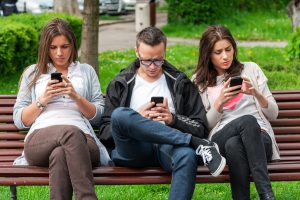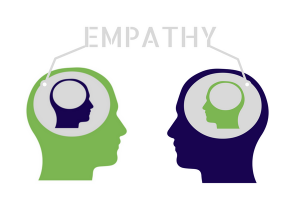What Happens When You Give Up Your Phone for 3 Days?
 What is your relationship like with your mobile phone? Do you use it for calls? Texts, social media, games, apps, Internet or all of the above? I use my phone for work, pleasure, socialising; It’s the first thing I pick up in the morning and the last thing I put down before I go to sleep. I even find it hard to put it face-down on the table, while eating in fear someone “needs me.” My partner always tells me to put it down and have a chat with her or concentrate on the issue or job at hand.
What is your relationship like with your mobile phone? Do you use it for calls? Texts, social media, games, apps, Internet or all of the above? I use my phone for work, pleasure, socialising; It’s the first thing I pick up in the morning and the last thing I put down before I go to sleep. I even find it hard to put it face-down on the table, while eating in fear someone “needs me.” My partner always tells me to put it down and have a chat with her or concentrate on the issue or job at hand.
In recent years, mobile phones have become a prevalent part of our lives. In England in the year 2000, 49 percent of people had mobile phones. In the year 2013, that number had jumped to 94 percent.
So, in the past 15 years, you have gone from a majority to a minority in not choosing to own a mobile phone.
One reason why this may be the case is that, while in the past, technology was used on the environment it was built for – For example TV for relaxing or computer in the office – mobile phones have bridged the gap, so we can relax, work or interact where ever and whenever we want.
No wonder so many of us see our mobile phone as an extension of ourselves and wouldn’t dare leave it at home.
Great, you may think – more choice, more freedom and more connectivity. What’s the harm in that?
Whilst the number of mobile phone users has climbed, so too have the number of people becoming addicted to technology. A study by researchers states, “significant mental and physical distress, panic, confusion and extreme isolation when forced to unplug from technology for an entire day.”
One day of non-usage of technology produces systems similar to drug withdrawal. Now that is startling.
So, why have so many of us been so seduced by technology that we can’t stand to be without it on a physical, cognitive or emotional level for a prolonged period?
Having read these articles, and thinking about my own phone usage, I thought to myself, “What would actually happen if I didn’t use it? If I didn’t connect on social media, would I have the same “mental and physical distress” as the students in the study?”
I think this would be a great learning experience to see exactly how much technology has impacted our lives.
So, I decided I would do three days of no mobile or social media. How would I cope? The results lay ahead.
Random Reward Generation:
I woke up with the same thought on day one as day two and three; “Where is my phone?’” The funny thing was that this wasn’t just when waking up but throughout the day. I would get tiny spikes of excitement, which would be met with a feeling of anxiety and dread, almost like I was at a loss without it. At the time, I attributed it to lack of connection or control, but in hindsight (and to go into theory for a moment) the act of looking at my phone to see if I had a missed call or text is similar to RRG. This is the same as the spike of dopamine one gets when gambling (essentially a random result induces this hit of dopamine). So, without the ability to refresh my emails and checking my phone, I felt at a loss. I couldn’t receive that warming hit of dopamine I was so used to and, therefore, felt anxiety and lack of control.
We could say that many of us are addicted to the continual spikes of dopamine induced by the use of our phone. And this is just to do with text messages and social media. Games, such as Candy Crush Saga, use the same mechanics in order to seduce players and get them spending money on power-ups in order to advance.
Connecting to our virtual self:
Something I missed throughout this experience was not being able to update and view my social media profiles. Mobile phones make it so easy to attend to our virtual identities and show our best side to the world. However, at what consequence? Not being able to edit my identity online led to great anxiety at first, but it put into perspective how much value I was putting onto this identity at the expense of my physical one. And who could blame me? The profiles we have online show our best attributes, our best pictures, the cool things we have done, but they fail to show the mundane lives we lead. It led me to understand why I felt the need to connect to others through this medium (as many others do too).
Perception of others:
From the beginning to the end of my research I was struck by other people’s reactions concerning my lack of connectivity. As I switched my phone on after day three, I had messages from friends and relatives complaining that I had not texted them back, I was rude etc. Now I am struck by research done by Prof. Susan Moeller from the University of Maryland, which states that “Many students could not give up technology as would be ostracized from their friends.” To give up technology is more than just reclaiming one’s space but to turn your back on your friends, relatives and even society. We have accepted the use of mobile phones so fully that one would be missing out if they didn’t have a mobile; almost, because everyone else does it, so do I – no matter what the consequences.
Space:
With all this being said, the key lesson I learned through those three days is about the excessive time spent using my phone, and it’s not just when I am using the phone; its seems I feel a constant connection with it. I am checking I have my phone, or wondering if someone has texted me or what’s going on social media in my absence, not to mention the pang of excitement and adrenaline at the thought of a text message.
Conclusion:
After my three days were up, I was left with the question what is my phone giving me? Much of the way we live is changing. What took me by surprise was the constant pang of excitement about checking my phone. It seems, unknowingly, we have been consumed by the constant hits of dopamine associated with randomness of text messages and calls coming through onto our mobiles. Not only this, but the amount of time we spend using technology through our phones is unprecedented. With so much time dedicated to our calls, what are we missing out on? We are so wrapped up in technology that we are missing out on living our physical lives and instead, are getting caught up in our virtual identities.
“Now that we can interact with hundreds – no, thousands – of people simultaneously, we’ve strengthened the impact that others have on our self-value,” says Dr. Andrea Letamendi, a psychologist at UCLA. We would rather the praise of 100 unknowns than one physical friend. In essence, mobile phones are changing the way we relate to others and indeed ourselves. We need instant gratification, more validation, more stimulation much more often.
To read the full heuristic report please visit http://philipontech.wordpress.com/mobilecell-phones/
Tags: addiction, technology









Interesting study— I’m over 60, so I can do without using my cell for half the day… But my grown kids Have to check their cells A lot during the day! They Depend on it for many things, where I still use Paper notes a lot— !
I need time to meditate and be in nature on the weekends
If someone calls that rude they are stepping way over my personal boundaries. If I need time to commune with the natural world that is my choice no one elses. Creator and
Mother Earth have way more ancient wisdom than any human. Get real.